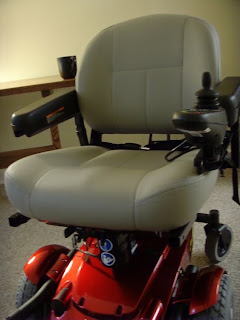My only experience with an earthquake was in the Silicon Valley of California where I was staring at my broken computer when the earth moved beneath me. The following day The San Jose Mercury News put the earthquake on page one because of its intensity and also contained an editorial on the
importance of being prepared.
My home—wife, two daughters, two cats—was back in North Carolina where I had worked in Research Triangle Park for two years (focusing on linking a computer to a telephone switch) when suddenly jobs in documentation that in one job interview I had been told was fated for life (gold watch and all) had disappeared. At the same time, my ability to walk had gone from being able to jog on the beautifully wooded track on the corporate campus, to being unable to stand without holding onto something, to tripping on my toes and dislocating my right shoulder.
An extensive search of databases showed San Jose, California, could not hire technical writers quickly enough. A longtime friend had extra room nearby and invited me to go west. I was hired immediately. I fell three times during a critical interview. My cane could not hold my weight. I had not yet acquired my first mobility device, a frontwheel drive scooter.
After my third fall, directly in front of my prospective boss’ feet, Vicki, who was in charge of the corporate quality assurance team, said, “Don’t worry. We have to hire you.” The reason I had to be hired was that the company, a global leader in computer wafer inspection devices, needed a writer for its new product which could predict when a wafer in the production process would be faulty and remove it from its production line on a timely basis. What the company had not prepared for was any safety orientation for disabled workers.
***
***
These details are relevant to the evolution of fire safety policies at Addison Court in downtown State College. They are relevant because first, until recently the idea of protecting the disabled and elderly from fire and other emergencies was low on our society’s consciousness. Second, limiting safety and access to one location and one building has long-term negative consequences to our country’s economy—an economy which to its detriment fails to make use of the talent of its disabled and elderly population.
R e g a r d i n g safety at Addison Court, a residence for 90 elderly and disabled individuals, where as a result of faulty fire alarms about two years ago, we learned from Steve Bair, fire director of Centre County’s Council of Governments (COG) and head of Alpha Fire Company, the proper way of evacuating a building made of brick with adequate sprinklers:
Do not evacuate. Wait for the fire company to come. Evacuation of disabled and elderly residents (in a multi-story building), especially when they have power chairs, wheel chairs, and the like, can induce panic.
Do not evacuate. Wait for the fire company to come. Evacuation of disabled and elderly residents (in a multi-story building), especially when they have power chairs, wheel chairs, and the like, can induce panic.
More on this do not evacuate concept which the fire authorities refer to as “defend in place” later. It makes good economic sense to protect disabled and elderly individuals from dying or being hurt in a fire or in some other disaster. A larger question is whether this society has the will to pay for safety, the understanding of where safety belongs in our order of priorities, and the willingness to teach and implement concepts like “defend in place.”
The most recent available Census Department statistics for Centre County (based on a 2006-2008 estimate) shows a total population of a little more than 144,000; 45,000 residents are 45 years old and older. Nearly 16,000 residents range in age from 65 years to over 85. What is the cost to Centre County and society at large to keeping these 16,000 residents safe and productive if many of them require special safety procedures? Who should pick up the tab? IWe need to invest in quieter, gentler fire alarms so that residents stay in place until the fire trucks come.
Several subjects require elaboration on the voiceswepage.org webpage: direct your browser to future blogs on the following subects:
- Administrative efforts to reduce panic.
- The continuation of my meandering earthquake story and where it fits into a larger picture.
- Plans to make Lady Gaga Fire Prevention Celebrity for Centre County.












